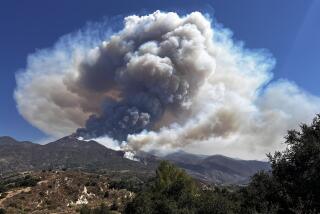Senate Nears Approval of Bill Allowing Forest Thinning
WASHINGTON — Responding to California’s devastating wildfires, the Senate on Wednesday moved toward approving a version of President Bush’s plan for limiting environmental and judicial reviews of forest-thinning projects he says are designed to reduce fire risk.
The measure, which has languished in the Senate for months, is expected to pass as early as today. “It is urgent not just because the Senate needs to respond in a heartfelt way to the tragedies in California,” said Sen. Ron Wyden (D-Ore.). “But if this legislation is not passed ... we will see that repeated again and again.”
The bill, based on Bush’s “healthy forests” initiative, is designed to speed the thinning of up to 20 million acres of federal forest land -- much of it in California. Environmentalists have attacked the legislation as a ploy to promote commercial logging far beyond communities facing potential threats.
Sen. Dianne Feinstein (D-Calif.), one of a bipartisan group of lawmakers who drafted a bill to end the legislative gridlock, flashed pictures on the Senate floor of fire-ravaged California communities. Then, turning to photos of homes surrounded by dry, insect-infested trees in the San Bernardino Mountains, she said: “Look at these homes. Look at the dead and dying trees. Does anyone believe they have a chance of surviving if this forest is not cleaned?”
Difficult negotiations between the House and the Senate lie ahead before a final bill can be sent to the president’s desk. Feinstein has said that she and other Democrats who support the Senate bill would not accept a Republican-drafted House measure approved earlier this year.
The White House expressed support for the bipartisan compromise in the Senate, but also backs the House bill. Mark Rey, undersecretary of Agriculture for natural resources and environment, described the two versions Wednesday as having more similarities than differences.
The Senate proposal poses a dilemma for Democrats because it is opposed by environmental groups, usually Democratic allies. But Senate Minority Leader Tom Daschle (D-S.D.), citing the California fires, said, “The risks of delay are simply too high.”
As a sign of the bill’s momentum, a spokesman for Sen. Barbara Boxer (D-Calif.), who previously favored an alternative measure, said that in light of Wednesday’s passage of two amendments she sponsored, she was leaning in support of the measure, provided there are no amendments to “worsen the bill.” Her amendments would require that the long-term health of firefighters who respond to disasters be monitored and require the Environmental Protection Agency to monitor and alert the public about air quality in disaster areas, such as fire zones.
The legislation grew out of last year’s Western wildfires, which scorched about 7 million acres and destroyed more than 800 homes in one of the worst fire seasons in decades. But it gained new urgency this week as the deadly fires swept through Southern California.
The Senate action came as congressional negotiators worked on a package to provide $500 million to respond to the California fires, as well as to Hurricane Isabel, as part of the $87 billion President Bush has requested for U.S. operations in Iraq and Afghanistan.
The Senate measure would authorize $760 million a year for forest-thinning projects, a $340-million increase from the current amount, targeting at least half of the money for projects on forest land closest to inhabited areas.
Both versions call for the Agriculture and Interior secretaries to decide which forests would be targeted for thinning projects. The Senate bill would limit court orders blocking such projects to 60 days, subject to renewal, while the House measure calls for such orders to be reviewed within 45 days.
Feinstein has called the Senate measure environmentally friendlier than the House bill because, she asserts, it would protect large old trees.
But Sen. Tom Harkin (D-Iowa) argued that the bill could open the forests to massive logging “in the name of wildfire prevention.” And he disputed that old-growth stands would be protected. “Large, even ancient trees that were around before the country was, could be logged.” Harkin also complained that the measure would limit environmental reviews of forest-thinning projects. Such reviews could call for alternatives to be considered if a thinning proposal could have a significant environmental effect. “Too little attention has been paid to date to the fact that thinning may or may not be effective in reducing fire risks,” he argued.
But Feinstein responded: “We know we need to thin these forests. We don’t need to study six or 12 different ways to do it.”
Proponents of the legislation contend that it would reduce “endless paperwork and red tape” that they say have delayed these projects, allowing the density of some forests to increase from 50 trees an acre to as many as 500 trees an acre.
Environmental groups argue that both the House and Senate bills would allow timber companies to cut healthy old trees and limit public say over logging projects on millions of acres of national forests. They dispute claims that environmental laws, or lawsuits, have delayed fire-prevention projects.
More to Read
Sign up for Essential California
The most important California stories and recommendations in your inbox every morning.
You may occasionally receive promotional content from the Los Angeles Times.










